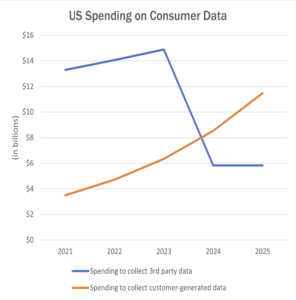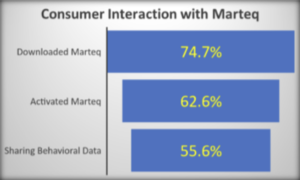Authors: Drew Clabes, Marketing Manager, Identity Praxis, Inc. and Michael J. Becker, CEO, Identity Praxis, Inc.
Published by the Mobile Ecosyestem Forum September 22, 2022.
September 2022, Michael Becker, Co-Founder & CEO of Identity Praxis and Mobile Ecosystem Forum (MEF) PD&I Working Group Chair, held an engaging interview with Co-Founder, and CTO of CYDigital John Rizzo. The two delve into the inspiration behind Marteq.io, a personal information management system (PIMS) that helps brands connect and reconnect with their customers on the principles of transparency, accountability, and individual data empowerment.
Click here to see the interview on YouTube (43:15 min)

Marteq.io Primary Sourcing Personal Data

Brands are pivoting to sourcing data directly from the individual. Why? To empower individuals. Build trust. Comply with regulations. Reduce risk. And more. As noted by CYDigital, by 2023 brand spending on user-generated data will outpace their spending on 3rd party data.
Marteq.io gives people a seat at the commercial table for their data. CY Digital’s Marteq.io is both a marketing automation offer platform and PIMS, enabling brands to launch connect, communicate, conduct commerce with, and reward their prospects and customers, for sharing their data directly with the brand (a practice known as zero-party data sourcing).
Zero-party data helps regulate the transfer of personal data information, as the individual–the zero part–is the source of their own data. With an application and service like Marteq.io, the on-and-off switch for sharing clickstream data is now at the fingertips of the individual. This benefits both sides. Consumers can generate passive rewards by sharing their behavior with trusted brands. Brands build trust and will have access to the insights they need to personalize and serve the connected individual with personalized ads, offers, and promotions ultimately equating to increased revenues, reduced costs, and reduced regulatory compliance.
With Marteq.io, brands can invite consumers to share their browsing behavior and location with them, and in return, the brand can reward the individual with unique offers and promotions. What’s unique about Marteq.io, however, is that the individual is in control. Marteq.io gives people the power to securely and safely collect their desktop and mobile browsing behavior and then selectively give brands permission to access this data so that the brand can personalize their experience and offer them rewards. Again, the individual is in control. At any time, they can revoke the access permissions they’ve given a brand.
Side note: Marteq.io is not alone in this space; there are other players offering similar solutions, including dedicated browsers, mobile apps, and extensions. We’ll report on these laters.
Understanding Types of Personal Data
According to Rizzo, data can be classified into two categories declarative, and behavioral data. Rizzo notes, declarative data is collected from consumers submitting forms, and services, or sharing other interests and preferences. Whereas behavioral data is data history, e.g., sites visited, media consumed, etc.– that reflects an individual's activities and can be used to infer their interests. Acquiring this data from the individual source can have exceptional benefits for brands. CYDigital, in one study, found that engaging people through Marteq led to an impressive 21% conversion rate and a 134% increase in average order value.
The True Value of a Consumer
The value of the data generated by each connected individual today is being consolidated by players like Google and Facebook. Rizzo points outs, that these firms are generating an average of $1,300-1,500 in advertising revenue from each user. Becker added to this point by sharing estimates from Jaron Lanier, who suggests that the annual value of an individual’s data to marketers is worth about $20,000. Using a tool like Marteq, brands increase the ROI of their marketing spend by redirecting to the individual.
Marteq.io December 2021 Adoption Study Results

In 2021, with Resondi, CYDigial conducted a Marteq.io adoption study with a group of 25,000 UK adults. They found that people are absolutely willing to share data with brands in return for value, and not just a few people: 74.7% of the people exposed to the study’s message of empowerment around data downloaded the Marteq.io browser extension. Of those 62.6% activated their account, and 55.6% explicitly turned on data sharing. In the end, over 26% of the audience became active users of Marteq.io.
These results are backed up by other industry research which suggests that people are ready and willing to share data when they are empowered and given the right offer. 89% of people are willing to share data with those they trust and for value. 71% are willing to share personal information about their likes, preferences, needs, etc. for better recommendations for their needs, and 26% are likely to share their personal information. The skepticism lies in what exactly is being done with my data, but once consumers are aware they’re more likely to give companies their desired information.
Conclusion
CYDigital’s values will last the test of time because unlike other companies Marteq.io intrusts personal data only to be handled by the software. The past has shown humans having access to data has caused many problems in terms of trust and control. Marteq.io and other PIMS will be the future of personal data collection. Marteq is an example for others to follow. Valuing the consumer brings benefits for all.
RELEVANT LINKS
- Michael Becker LinkedIn: https://www.linkedin.com/in/privacyshaman/
- John Rizzo LinkedIn: https://www.linkedin.com/in/rizzo/
- Identity Praxis: https://identitypraxis.com/
- CyDigital: https://www.cyd.digital/
- Mobile Ecosystem Forum Personal Data & Identity Working Group: https://mobileecosystemforum.com/personal-data-identity/
- Marteq.io consumer adoption research results: https://www.cyd.digital/supporting-content
- Tom Fishburne Markettoonist: https://marketoonist.com/2022/09/lifecycle-of-social-media.html
- Data completeness a key to effective net-based customer service systems: https://dl.acm.org/doi/10.1145/777313.777339

No Comments.